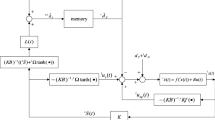Abstract
An iterative error compensation approach is proposed in this article to improve the accuracies of high speed, computer-controlled machining processes. It is well known that the high-speed computer-numerically-controlled (CNC) machines are extremely useful in terms of manufacturing mass-produced parts. The proposed method uses an iterative learning technique that adopts the servo commands and cutting error experienced in previous maneuvers as references to current compensative actions. Moreover, non-repetitive disturbances and nonlinear dynamics of the cutting processes, and servo systems of the CNC machine that greatly affect the convergence of the learning-control systems were also studied in this research. State feedback and output feedback techniques were adopted in the proposed controller design. In addition to the stability analysis, a 1 degree-of-freedom servo positioning system is constructed to evaluate the performance of our proposed learning control approach. Both the simulation and experimental results verify the effectiveness of our approach.
Similar content being viewed by others
References
Abdelnour GM, Chang CH, Huang FH, Cheung JY (1991) Design of a fuzzy controller using input and output mapping factors. IEEE Trans Syst, Man, and Cybernetics, September/October, 21(5):952–960
Arimoto S, Kawamura S, Miyazaki F (1984) Bettering operation of robots by learning. J Robot Syst 1:123–140
Geng Z, Carroll R, Xie J (1990) Two-dimensional model and algorithm analysis for a class of iterative learning control systems. Int J Control 52:833–862
Horowitz R (1991) Exponential convergence of a learning controller for robot manipulators. IEEE Trans Automatic Control, July, 36(7):890–894
Kurek JE, Zaremba MB (1993) Iterative learning control synthesis based on 2-D system theory. IEEE Trans Automatic Control, January, 38(1):121–125
Sutton RS, Barto AG (1998) Reinforcement learning, an introduction. MIT Press, Cambridge, MA
Bucak IO, Zohdy MA (1999) Application of reinforcement learning control to a nonlinear bouncing cart. Proc Am Control Conference, June, American Automatic Control Council, San Diego, CA, pp 1198–1202
Wu QH, Pugh AC (1993) Reinforcement learning control of unknown dynamic systems. IEE Proc-D 140(5):313–322
Moore KL (1993) Iterative learning control for deterministic systems. Springer, London
Santamaria JC, Sutton RS, Ram A (1998) Experiments with reinforcement learning in problems with continuous state and action spaces. Adaptive Behav 6(2):163–218
Srinivasan K, Shaw F-R (1991) Analysis and design of repetitive control systems using the regeneration spectrum. ASME J Dynamic Syst, Measurement, and Control, June, 115(2):216–222
Roesser R (1975) A discrete state-space model for linear image processing. IEEE Trans Automatic Control, February:1–10
Pon C-Y (1995) Theory and experiments on the stability of iterative learning control of system with uncertain dynamics. Thesis, Tatung University
Author information
Authors and Affiliations
Rights and permissions
About this article
Cite this article
Hsu, KS., Her, MG. & Cheng, MY. Analysis and experiments of iterative learning-control system with uncertain dynamics. Int J Adv Manuf Technol 25, 1119–1129 (2005). https://doi.org/10.1007/s00170-003-1949-7
Received:
Accepted:
Published:
Issue Date:
DOI: https://doi.org/10.1007/s00170-003-1949-7




